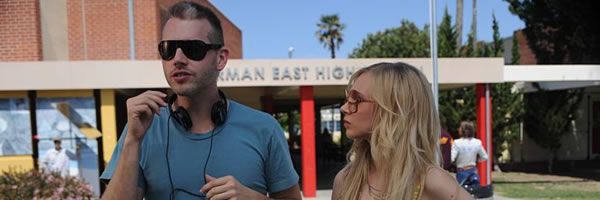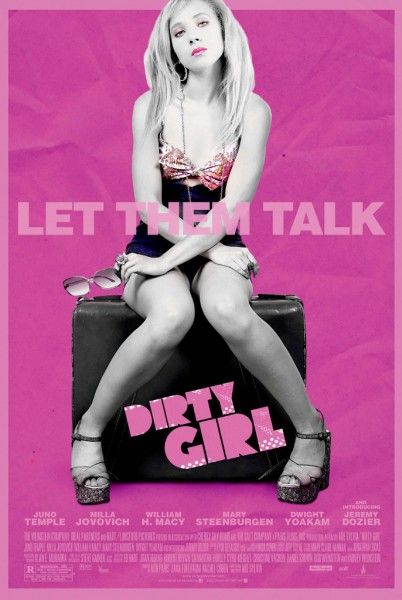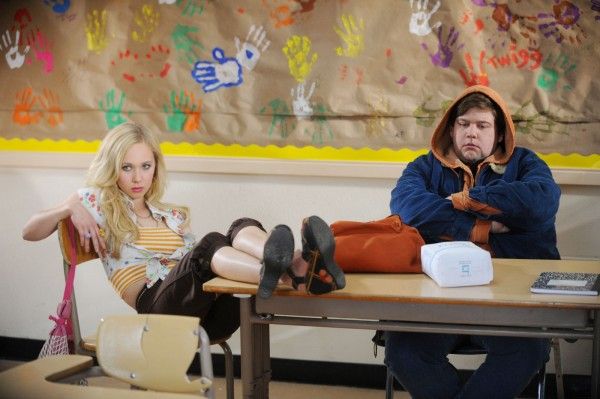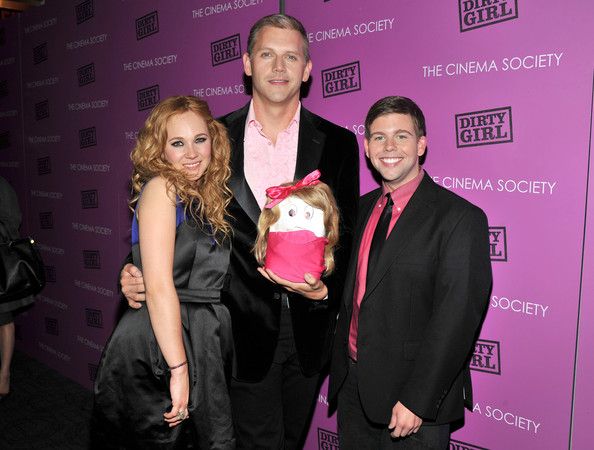For writer/director Abe Sylvia, his debut feature Dirty Girl is clearly a passion project as well as a labor of love and, after five years, it’s finally reaching the big screen. Set in 1987, the film tells the story of Danielle (Juno Temple), the “dirty girl” of Norman High School in Norman, Oklahoma, who meets the shy and closeted Clarke (Jeremy Dozier) in the remedial class she is banished to for her misbehavior. As the two form an unlikely friendship, they go on an adventure to California that leads them to discover each other and themselves.
At the film’s press day, filmmaker Abe Sylvia talked to Collider for this exclusive interview about writing this film as a classroom project in grad school at UCLA, how he knew he would have to be the one to direct a story that was so personal, that he sees this as a tribute to his own “dirty girl” in high school (known as Dirty Debbie), how surprised he was to actually get to make the film he wanted to make, and how there’s a hilarious blooper reel that might end up on the DVD release. He also said that he just turned in a pilot to HBO that he’s currently developing, and that he’s got a couple of feature scripts ready to go as well. Check out what he had to say after the jump.
How did Dirty Girl come about? What prompted you to write this story?
ABE SYLVIA: I wrote it as a classroom project, when I was in grad school at UCLA, for a screenwriting class. It was my first screenplay, and they say to write about what you know, so I wrote about growing up in Oklahoma in the ‘80s. I’ve always had a fascination with iconoclastic women, and I wanted to tell a love story about two kids who have that kind of relationship. I’ve had that kind of friendship repeatedly, in my life, with all these great women. What I love about them is that they don’t seem afraid of the world. For them, they love that about me, that I love that about them. That’s what our friendship is based on. And, that was not a movie I had seen before. Because I was riffing on something that was personal, the script came together pretty quickly, and yet none of the events are true. It’s this weird thing where it’s ultra-personal, and yet none of this happened.
Did you always have the intention of directing it yourself?
SYLVIA: I went to film school to be a director and the impression I was getting was that you have to control the material, if you want a career as a director, certainly just starting out. It looked like too long of a road to go through commercials and music videos, and then hope that I’d get a TV show. I was like, “I’m going to write a story that’s personal and is mine, and that nobody else will know what to do with.” The tone is one of the things I’m most proud of with the film. American comedies tend to be a bit homogenized in tone, and what I really want to play with are ideas of camp and music, and placing those next to high drama and melodrama, and letting stories go places that are terrifying, and then there’s a musical number. It’s all about how you navigate those themes. That happens a lot in foreign films, and we don’t necessarily allow for that in American films. That’s my aesthetic. I’m pulling from lots of things that I love, and re-interpreting them and mixing them up.
Do you see this as a tribute to your Dirty Debbie, as well as all the other women who have made an impression on your life?
SYLVIA: Absolutely, yeah! I hope Dirty Debbie likes this movie. That girl is iconic to everybody. We all have come in contact with a girl who is not just sexually provocative or promiscuous, but who seems to know more than the rest of us and sees through people’s bullshit. I’m a gay man who loves women, and who loves a strong female character. It’s a tribute to every great broad I’ve ever known, and I’ve known some great ones. I was a Broadway dancer, and those showgirls are the funniest people, and they’re so smart and beautiful. They get what they want and they’re just fabulous people. And, the girls I went to school with in college, in my theater school, were just outspoken, loud, funny women. And then, I went to grad school and teamed up with all of these girls who were trying to be filmmakers, and were really trailblazers in their own lives. Every time I was in a new situation, I always gravitated to those girls, and we always made such a great creative pair.
In the years that it took to get this made and financed, are you surprised that you ultimately were able to make the film that you wanted to make?
SYLVIA: Yes, I am surprised. When you’re putting something together, you have to make sure that everybody is there for the right reasons, and that not only are your producers saying the right things, but they’re doing the right things. I got very lucky with my producers, in that all of them were on board with making the movie that was on the page. I said no to people who wanted to change too much. They said, “We’ll do it, but can the boy just have glasses, and then take them off and be really cute?” And I said, “No, we can’t, and you’re not producing my movie.” I said no to a lot of opportunities because people liked the script, but said, “We can make it, if the boy is hot.” I was like, “You don’t get it. Why start? It feels like this is a going nowhere opportunity because you’re going to take the heart out of it, and then no one is going to want to make it.” Or, they were like, “Can she not cuss?” I was like, “No, she has to cuss!” Luckily, the right people decided to make it, for the right reasons and in the right way.
Do you think the time you spent working on Broadway and working with ensembles like that, really gave you the confidence in being the one at the helm?
SYLVIA: Yeah, absolutely! I was in a lot of situations where I’d have to wrangle a lot of creative people, or be one who was wrangled and watching people who were good at it, like Susan Stroman and Tommy Tune. Not only was I one that side of things, trying to do that for myself, but I was also a part of it and watching people do it. In creating dances and teaching kids and putting numbers up and trying to get them all to work as a group are skills that hits a lot of directors like a ton of bricks, when they get to film school. It’s like, “How many questions do I have to answer in the next five minutes, and keep my cool? How do I keep 45 people moving towards the same goal?” Definitely, my time in the theater informed that. It’s not so different. We just add a camera.
How long was your casting process for this film?
SYLVIA: It was long. The two kids were paramount to find. We read kids for months. Our financing fell apart, a couple of times, even in the process of casting. All told, we were reading people for probably two years, until we landed on that combination of Juno [Temple] and Jeremy [Dozier]. For the adults, it was a lot of sending the script around and getting the right people to do it for the right reasons. We definitely landed on that, with these five actors.
Did you have a moment where you really just knew that Juno Temple was your girl?
SYLVIA: I think the second she was done with the material, for her first reading. She nailed it. She just came in and owned it, and she owned it in a way that was different. You realize that a lot of people are going to come in and read your material in the exact same way. The hair is just different. And then, somebody comes in and not only do they own it, but they add something extra special to it, and they do it in a way that nobody else is going to do it. That was Juno.
What did you see in Jeremy Dozier, with him having had no experience, and this being such a complex and layered role?
SYLVIA: As much as his audition was good, his tape was so charming. It came to us from Texas, shot in his dorm room, and I thought it was just the most heartfelt attempt to impress. The acting was also very, very good, but that part was what appealed to me. It was a sincere effort. This kid is true blue, and I knew that was going to come through on film. Somebody can say the lines and get a laugh, but that extra layer of humanity came through with Jeremy. He’s a very different person than Clarke, in life, but that sweetness and that good heart is who he is, as a person. You can’t fake that.
Being a first-time feature director, were you surprised with the level of talent you got for this film?
SYLVIA: Yeah, I was pinching myself, every day. Honestly, I was. I was surprised. I think they just responded to the script and knew that they could own that character. They thought, “This is something that I can not only do, but that I can do really well.”
Did you do anything with the actors to get them to be so free on camera?
SYLVIA: With Juno and Jeremy, we just hung out a lot. I didn’t want to over-rehearse things. I knew that they were right for their parts, and I knew that when they came to set, they would know their lines. We just did a lot of hanging out, so that they were friends, when we got to the set. That was the most important thing. I had directed them for their three or four auditions, so I already knew that they were in the zone, and I didn’t want to mess with that. You don’t want things to become stilted and over-rehearsed, especially in film, so we flew by the seat of our pants, a lot of the time. Sometimes that gets the most interesting result. It gets a really alive result.
Are there things that you have planned for the DVD release?
SYLVIA: My editor cut a bloopers reel that’s a very classic ‘80s reel. In the ‘80s, when the credits would roll, it would be like, “Here’s all the times we fucked up.” We have a reel like that, and we towed with putting it on the end of the movie, but the movie is too sweet at the end. But, we do have this blooper reel and what I love about it is that it shows how much fun we had. Now that the movie exists as its own thing, I can separate myself from the shooting of it, but when I watch that, I remember how much fun we actually had. It’s the before and after moments of takes. There’s this great moment where Juno is leaning in and looking at her father in the yearbook, for the first time, and off camera, you hear my D.P. fart. You hear it and Juno busts up, and I just love that moment. Maybe some of those things will end up on the DVD. I don’t know. Sometimes you don’t want to cheat the audience of their experience, either. We’ll see. It’s for me, for now.
What are you going to be doing next?
SYLVIA: I just turned in a pilot to HBO, so I’m working on that. That’s so new that we literally turned in the script a couple days ago. And, I’ve got a couple of feature scripts that I’ve finished, that are next in line to get going.




